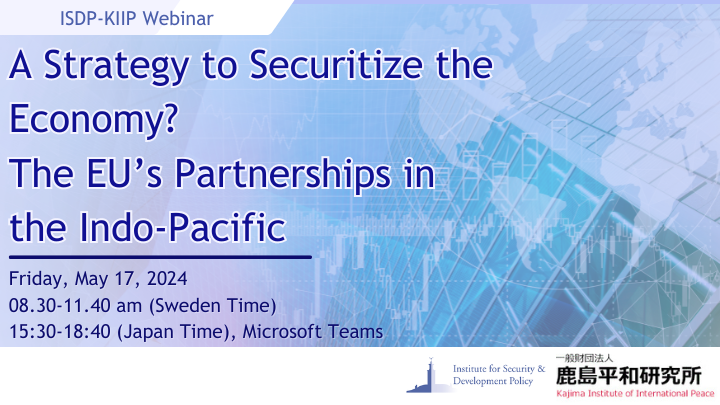A Strategy to Securitize the Economy? The EU’s Partnerships in the Indo-Pacific

Friday 17 May 2024 / 08:30 - 11:40 / Microsoft Teams
Microsoft Teams. Webinar, online .
RSVP Register here
The economic instability due to the disruption of supply chains post the COVID-19 pandemic has compelled states across the world, including the European Union (EU) and its members to rethink economic security strategies and policies. Soon after, Russia’s brutal invasion of Ukraine resulted in further weakening of the global order, including economic, food, and energy security. This necessitated notions of the “de-coupling” and, recently a much more feasible sounding, “de-risking” for creating new resilient measures, including supply chains, as well as upgrading the existing policy frameworks among the global economies. The EU – which for long seemed like a political bystander – today seems to be in the process of reconfiguring its economic, diplomatic, and foreign policies and outlook.
In the last few years, the EU has launched its strategy for the Indo-Pacific (2021); unveiled its connectivity pivot to a region that is the world’s current center of geo-economic gravity with the €300 billion Global Gateway project (again 2021), seen by some as a counter to China’s Belt and Road Initiative (BRI); upgraded its Maritime Security Strategy (2023); and unveiled a new Economic Security Strategy (2023), as well as added new initiatives (2024) to further strengthen its economic security measures.
In particular, the EU’s newly launched Economic Security Strategy primarily focuses on enhancing economic resilience, trade, and investment. It aims to not just improve the EU’s competitiveness as a single market, but also importantly de-risk in four main areas of supply chains; critical infrastructure; technology, including leakage; and coercion tactics, including by states. The latter goal (geoeconomic de-risking) will have an impact beyond the European neighborhood. Notably, partnerships with like-minded states are a vital component of the Economic Strategy’s toolkit.
In this context, the EU’s partnerships with Indo-Pacific stakeholders and regional states with growing power such as India, Japan, South Korea, and Southeast Asian states, as well as regional multilateral organizations such as the Association of Southeast Asian Nations (ASEAN) will naturally need to be taken into account, as part of the EU-Indo-Pacific “interdependent future” compulsion. The reasons are multi-fold: Indo-Pacific’s centrality for European economic interests, including the maritime trade through the Indo-Pacific’s vital sea lines of communication (SLOCs); Europe’s dependence on China as a top trading partner; China’s growing technological capabilities; China’s continuous leveraging of its economic, diplomatic, technological power as a coercion tool with partners and rivals alike; and the impact of growing US-China trade rivalry, including the ongoing chip war, among others.
As the EU seeks to strengthen its presence in this dynamic and economically significant area, the Economic Security Strategy comes as a pivotal component of its comprehensive approach to the region, aligning economic interests with overall goals of peace, security, and sustainable development. In particular, the EU Strategy for Cooperation in the Indo-Pacific will assume greater relevance. In other words, in integrating its economic objectives into the broader geopolitical context, the EU recognizes that fostering economic partnerships in the Indo-Pacific is intricately linked to regional security and political stability. The EU hopes to achieve this through increased trade deals, investments in infrastructure and sustainability projects, and collaboration on technological advancements.
Already, the EU has established Trade and Technology Councils (TTC) with not just the US but also India. India and the EU are also working on launching a free trade agreement (FTA) at the earliest possible, which is looking increasingly likely after the signing of the FTA with the European Free Trade Association (EFTA) comprising Iceland, Liechtenstein, Norway, and Switzerland. Such measures recognize India’s economic and technological importance for the future and as China’s major regional rival.
At the same time, the Joint Communication on “European Economic Security Strategy,” does not mention China directly as a regional rival. The absence of China’s direct mention in the Joint Communication on “European Economic Security Strategy,” however, highlights Europe’s continuing dilemma on an unambiguous China policy. Against the aforementioned scenario and the still undergoing evolution in economic strategies and geopolitical landscape, it is important to generate topical debates at this point.
The following are thus some of the relevant questions that this panel would like to address:
- How would the EU navigate geopolitical complexities in the Indo-Pacific to secure its economic interests?
- How effective will the EU’s Economic Security Strategy be as a supportive framework of its Indo-Pacific approach, and in countering the economic influence of other major players in the Indo-Pacific, such as China? In particular, how can it strengthen the EU-Indo-Pacific supply chain connection?
- What partnerships and alliances should the EU prioritize to enhance economic security in the region? How does its Economic Security complement those of its partners like Japan, Australia, India, and ASEAN?
- How can the EU balance its economic interests with its values of human rights and environmental protection in its dealings with Indo-Pacific nations?
Speakers:
 Dr. Alessia Amighini is an Associate Professor of Economics at the Department of Economic and Business Studies at the University of Piemonte Orientale (Novara, Italy) as well as Co-Head of Asia Centre and Senior Associate Research Fellow at ISPI (Milan, Italy). She is a non-resident fellow at Bruegel since November 2022. Alessia previously worked as an Associate Economist at the United Nations Conference on Trade and Development (UNCTAD, Geneva, Switzerland). Alessia holds a PhD in Development Economics from the University of Florence (Italy) and a Master in Economics as well as a BA in Economics from Bocconi University (Milan, Italy).
Dr. Alessia Amighini is an Associate Professor of Economics at the Department of Economic and Business Studies at the University of Piemonte Orientale (Novara, Italy) as well as Co-Head of Asia Centre and Senior Associate Research Fellow at ISPI (Milan, Italy). She is a non-resident fellow at Bruegel since November 2022. Alessia previously worked as an Associate Economist at the United Nations Conference on Trade and Development (UNCTAD, Geneva, Switzerland). Alessia holds a PhD in Development Economics from the University of Florence (Italy) and a Master in Economics as well as a BA in Economics from Bocconi University (Milan, Italy).
 Dr. Loïc Simonet is a Senior Researcher at the Austrian Institute for International Affairs in Vienna. Dr. Simonet started his career at the French Defence Ministry in Paris. In 2008, he was appointed Politico-Military Counsellor of the French Permanent Representation to the Organization for Security and Co-operation in Europe (OSCE) in Vienna. In 2013, he joined the Secretariat of the OSCE as Senior External Co-operation Officer, until June 2021. In this capacity, he liaised with the European Union and NATO. In 2021, he joined the Austrian Institute for International Affairs (Oiip) as a Senior Researcher, and his research specialization and interest are European security architecture, OSCE and Multilateralism with a focus on tomorrow’s challenge, and Oil and Gas pipelines.
Dr. Loïc Simonet is a Senior Researcher at the Austrian Institute for International Affairs in Vienna. Dr. Simonet started his career at the French Defence Ministry in Paris. In 2008, he was appointed Politico-Military Counsellor of the French Permanent Representation to the Organization for Security and Co-operation in Europe (OSCE) in Vienna. In 2013, he joined the Secretariat of the OSCE as Senior External Co-operation Officer, until June 2021. In this capacity, he liaised with the European Union and NATO. In 2021, he joined the Austrian Institute for International Affairs (Oiip) as a Senior Researcher, and his research specialization and interest are European security architecture, OSCE and Multilateralism with a focus on tomorrow’s challenge, and Oil and Gas pipelines.
Discussants:
 Mr. Gary Ng is the Senior Economist for Asia Pacific at Natixis and a Research Fellow at the Central European Institute of Asian Studies (CEIAS), specializing in economic and thematic research. His research links the Asia Pacific macroeconomy and geopolitics with global trade and supply chain, industrial and government policies, technology and innovation. He is active in international media with in-depth commentaries, including but not limited to Bloomberg, CNBC, Financial Times, Nikkei Asia, and South China Morning Post.
Mr. Gary Ng is the Senior Economist for Asia Pacific at Natixis and a Research Fellow at the Central European Institute of Asian Studies (CEIAS), specializing in economic and thematic research. His research links the Asia Pacific macroeconomy and geopolitics with global trade and supply chain, industrial and government policies, technology and innovation. He is active in international media with in-depth commentaries, including but not limited to Bloomberg, CNBC, Financial Times, Nikkei Asia, and South China Morning Post.
 Dr. Kaewkamol Pitakdumrongkit is a Senior Fellow and Head of the Centre for Multilateralism Studies, at S. Rajaratnam School of International Studies (RSIS), Nanyang Technological University, Singapore. She is also a Non-Resident Fellow at the National Bureau of Asian Research, USA. Her research interests include Indo-Pacific governance and integration, regional-global economic governance dynamics, ASEAN Economic Community, ASEAN’s external relations, and digital economy. She has published in various outlets such as Asia-Pacific Bulletin, Australian Journal of International Affairs, Australian Outlook, The Diplomat, East Asia Forum, Eurasia Review, Global Asia, The Diplomat, The International Relations of the Asia-Pacific, The Pacific Review, Review of International Political Economy, and The Singapore Economic Review.
Dr. Kaewkamol Pitakdumrongkit is a Senior Fellow and Head of the Centre for Multilateralism Studies, at S. Rajaratnam School of International Studies (RSIS), Nanyang Technological University, Singapore. She is also a Non-Resident Fellow at the National Bureau of Asian Research, USA. Her research interests include Indo-Pacific governance and integration, regional-global economic governance dynamics, ASEAN Economic Community, ASEAN’s external relations, and digital economy. She has published in various outlets such as Asia-Pacific Bulletin, Australian Journal of International Affairs, Australian Outlook, The Diplomat, East Asia Forum, Eurasia Review, Global Asia, The Diplomat, The International Relations of the Asia-Pacific, The Pacific Review, Review of International Political Economy, and The Singapore Economic Review.
Moderator:

Dr. Jagannath Panda is the Head of the Stockholm Center for South Asian and Indo-Pacific Affairs at the Institute for Security and Development Policy, Sweden. He is a Professor at the Department of Regional and Global Studies at the University of Warsaw, and a Senior Fellow at The Hague Center for Strategic Studies (HCSS) in the Netherlands and an International Research Fellow at the Canon Institute for Global Studies in Japan. Dr. Panda has testified to the US-China Economic and Security Review Commission at the US Congress. He is also the Series Editor for Routledge Studies on Think Asia.